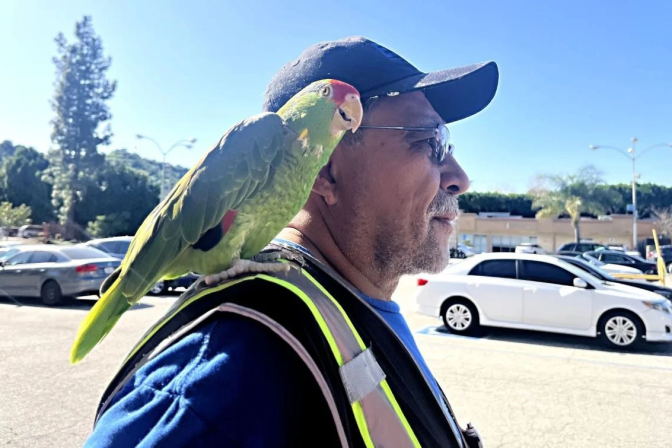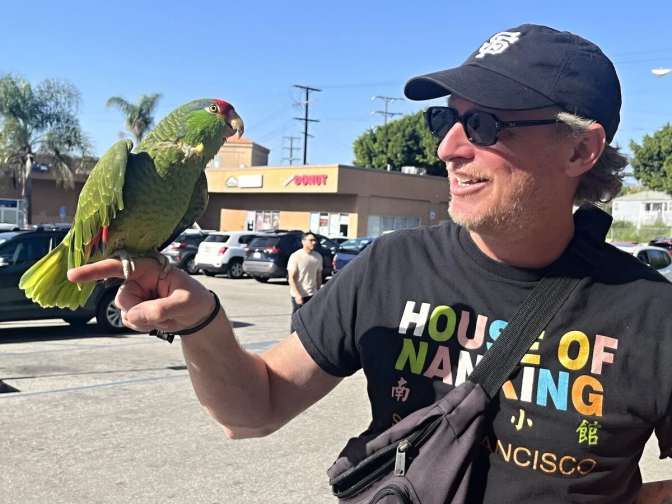The U.S. Department of Veterans Affairs has said it plans to appeal a federal judge's decision to have the department foot the bill for building emergency veteran housing at the West L.A. campus.
Brad Rosenberg, the department's attorney, said in court Friday that the appeal will be filed next week. Part of it will argue that the payment will cause irreparable harm to the V.A.'s funding.
But U.S. District Judge David O. Carter said that for now, the construction must continue.
"Until I get a stay from the Ninth Circuit, we go forward," he said, adding that he wants quick work to bring veterans indoors before the rainy season.
On Sept. 6, Carter ruled on a lawsuit on behalf of veterans with disabilities, issuing two emergency orders to speed up the creation of temporary “modular” housing on the campus — essentially, tiny homes that are built ahead of time in factories.
Carter continued to pressure officials on speeding up the timeline for the temporary housing. Kelly Farrell from the architectural firm Gensler, which is working on the housing plans, said they're still narrowing down specifics for utilities to meet housing standards.
Carter pushed back.
"We can truck in showers. We can truck in toilets. We can get sewage overland, you don’t have to trench," he said. "You’ve already got lighting in the stadium for goodness sakes. I don’t want perfect — I want good."
Background on the case
Carter has ordered the creation of 2,550 additional housing units for unhoused veterans — including 750 temporary homes with supportive services within 18 months at the sprawling West L.A. Veterans Affairs campus, and construction of additional 1,500 permanent homes with services at the campus within the next six years.
The judge also ruled against a series of private leases on the West L.A. campus, writing that VA officials “are prohibited from executing and maintaining any land use agreement, including those identified by this Order, that does not principally benefit veterans and their families pursuant.”
He also banned the VA from entering into new leases with the private Brentwood School (whose athletic facilities are on the campus), Safety Park (which operates two parking lots on the campus), Bridgeland Resources (which has an oil drill on the campus), and UCLA (whose baseball stadium is on the land).
The lawsuit was filed in November 2022. It came after the VA got years behind schedule in following through on a previous settlement deal from 2015 to build more housing at the campus.
What judge Carter had to say
VA officials bowed to wealthy neighbors: Noting that VA officials had entered into lucrative land deals for portions of the property, Carter wrote that instead of serving veterans, "the West LA VA has served its wealthy and powerful neighbors, bowing to private interests backed by lobbyists and engaging in back-room deals and fraud.”
A contrast with funding for war: Carter, a Marine Corps veteran who was so injured in a Vietnam War battle that he was put in a body bag, said the federal government has failed those who served: “Veterans have seen the government swiftly deploy its resources to send them into conflict, then claim an inability to overcome funding shortfalls and administrative hurdles when they need shelter and housing back at home.”
Judge cites corruption: “Over the past five decades, the West LA VA has been infected by bribery, corruption, and the influence of the powerful and their lobbyists, and enabled by a major educational institution in excluding veterans’ input about their own lands,” the judge wrote.
Among other things, he pointed to a scandal in which a private parking lot operator pleaded guilty to bribing a VA official and stealing $13 million in connection with a lease at the campus.
Failed promises: Carter faulted the current and previous two presidential administrations for not following through on promises to end veteran homelessness. He wrote: “In the years since 2011, the Obama administration, the Trump administration, and the Biden administration have each promised that they would act swiftly to eradicate veteran homelessness in America. Yet, today, approximately 3,000 homeless veterans live in the Los Angeles area alone.”
What the parties had to say
Plaintiffs' response: Mark Rosenbaum, the lead attorney for the plaintiffs, told LAist the ruling is “an enormous victory” for unhoused veterans. He said the judge, through his ruling, is saying “no veteran who served this country should be on the streets of Los Angeles or, frankly, the streets of this nation.”
“It’s the end of veteran homelessness,” Rosenbaum added.
VA response: In a statement from Damian McGee, director Los Angeles Regional Office of Public Affairs, the VA said "there is nothing more important to VA than ending Veteran homelessness, and our efforts have led directly to a 23% reduction in Veteran homelessness in Los Angeles in 2024 and a 55% reduction in Veteran homelessness nationwide since 2010."
"The court exceeded its legal authority, and its orders would prevent VA from fulfilling our mission to end Veteran homelessness by diverting critical resources from efforts that are proven to get Veterans off the streets and save lives — including VA health care, permanent housing support, legal assistance, job training, and much more," the statement added. "This would negatively impact Veterans and their families, both in LA and across America, and VA is beginning the appeal process to prevent that from happening."










